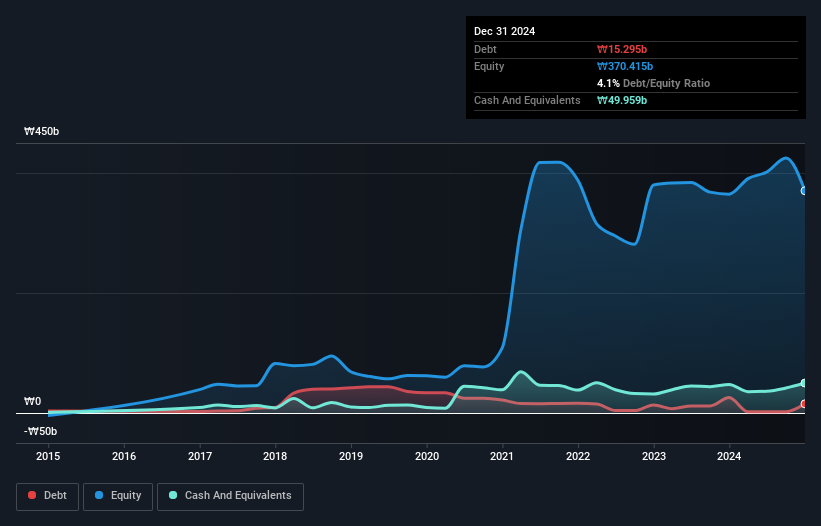Legendary fund manager Li Lu (who Charlie Munger backed) once said, 'The biggest investment risk is not the volatility of prices, but whether you will suffer a permanent loss of capital.' It's only natural to consider a company's balance sheet when you examine how risky it is, since debt is often involved when a business collapses. Importantly, Neptune Company (KOSDAQ:217270) does carry debt. But the more important question is: how much risk is that debt creating?
We check all companies for important risks. See what we found for Neptune in our free report.Why Does Debt Bring Risk?
Debt is a tool to help businesses grow, but if a business is incapable of paying off its lenders, then it exists at their mercy. Part and parcel of capitalism is the process of 'creative destruction' where failed businesses are mercilessly liquidated by their bankers. However, a more usual (but still expensive) situation is where a company must dilute shareholders at a cheap share price simply to get debt under control. Of course, the upside of debt is that it often represents cheap capital, especially when it replaces dilution in a company with the ability to reinvest at high rates of return. When we think about a company's use of debt, we first look at cash and debt together.
What Is Neptune's Debt?
As you can see below, Neptune had ₩15.3b of debt at December 2024, down from ₩25.6b a year prior. However, it does have ₩50.0b in cash offsetting this, leading to net cash of ₩34.7b.

How Strong Is Neptune's Balance Sheet?
The latest balance sheet data shows that Neptune had liabilities of ₩21.7b due within a year, and liabilities of ₩15.4b falling due after that. Offsetting this, it had ₩50.0b in cash and ₩21.7b in receivables that were due within 12 months. So it can boast ₩34.6b more liquid assets than total liabilities.
This surplus suggests that Neptune has a conservative balance sheet, and could probably eliminate its debt without much difficulty. Simply put, the fact that Neptune has more cash than debt is arguably a good indication that it can manage its debt safely.
View our latest analysis for Neptune
Better yet, Neptune grew its EBIT by 299% last year, which is an impressive improvement. If maintained that growth will make the debt even more manageable in the years ahead. When analysing debt levels, the balance sheet is the obvious place to start. But it is Neptune's earnings that will influence how the balance sheet holds up in the future. So if you're keen to discover more about its earnings, it might be worth checking out this graph of its long term earnings trend.
Finally, a business needs free cash flow to pay off debt; accounting profits just don't cut it. While Neptune has net cash on its balance sheet, it's still worth taking a look at its ability to convert earnings before interest and tax (EBIT) to free cash flow, to help us understand how quickly it is building (or eroding) that cash balance. Over the last two years, Neptune actually produced more free cash flow than EBIT. That sort of strong cash conversion gets us as excited as the crowd when the beat drops at a Daft Punk concert.
Summing Up
While we empathize with investors who find debt concerning, you should keep in mind that Neptune has net cash of ₩34.7b, as well as more liquid assets than liabilities. And it impressed us with free cash flow of ₩21b, being 223% of its EBIT. So is Neptune's debt a risk? It doesn't seem so to us. Above most other metrics, we think its important to track how fast earnings per share is growing, if at all. If you've also come to that realization, you're in luck, because today you can view this interactive graph of Neptune's earnings per share history for free.
Of course, if you're the type of investor who prefers buying stocks without the burden of debt, then don't hesitate to discover our exclusive list of net cash growth stocks, today.
Valuation is complex, but we're here to simplify it.
Discover if Neptune might be undervalued or overvalued with our detailed analysis, featuring fair value estimates, potential risks, dividends, insider trades, and its financial condition.
Access Free AnalysisHave feedback on this article? Concerned about the content? Get in touch with us directly. Alternatively, email editorial-team (at) simplywallst.com.
This article by Simply Wall St is general in nature. We provide commentary based on historical data and analyst forecasts only using an unbiased methodology and our articles are not intended to be financial advice. It does not constitute a recommendation to buy or sell any stock, and does not take account of your objectives, or your financial situation. We aim to bring you long-term focused analysis driven by fundamental data. Note that our analysis may not factor in the latest price-sensitive company announcements or qualitative material. Simply Wall St has no position in any stocks mentioned.
About KOSDAQ:A217270
Flawless balance sheet and fair value.
Market Insights
Community Narratives




